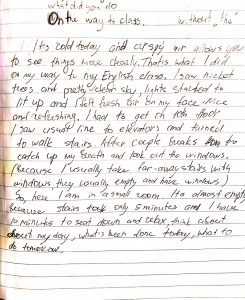Student’s name: Yulia Funnye
Course/Section: Eng1121/E106
Instructor’s name: S. Shcmerler
Date: 2/25/2019
Facets of Freedom
‘Go, be free!’ says my husband, when I leave him with our baby boy to go do some things that need to be done. For me, it’s almost offensive: how can I “be free” while I’m away from my boys?! It does not feel like freedom. It feels like I’m ripping half of my heart out and leaving it at home or, at the very least, an arm. I step outside and look at the blue sky, white clouds and shining sun. The world is still there. Surprisingly, universe did not crumble down only because I left home. Now I can feel the freedom.
I believe, freedom is very individual thing, like a fingerprint. For example, freedom for one person could be the worst confinement for another. My grandmother likes to live alone, she feels like her freedom is violated when guests are staying too long. On the other hand, my mother can’t find freedom and peace when her husband goes on a business trip. Freedom can be different even for the same person at different stages in the life. I used to think that only odd people go to the movies alone, now I am that odd person, because it makes me feel good and free. Freedom has numerous facets. Now, let’s look at some of them.
Ultimately, freedom seems like a luxury. According to one of the most accepted developmental theories: Pyramid of Needs theory by American psychologist A. Maslow (1943), human development can be viewed as “climbing” a pyramid from survival needs at the bottom to self-actualization (or Ultimate Freedom, as I see it) at the top. In general, this means you can’t even think about freedom, or even about trying a new hobby, until you have air to breath, food to eat, roof other your head and, maybe, some money. Good example of priority to satisfy you survival needs first can be found in the autobiography of American minister and human rights activist Malcolm X, which he wrote in 1965. Malcolm X shares his memories about the time he spent in Charleston Prison. Malcolm X explains, how for the first time in his life he was able to focus. Imprisonment allowed Malcolm X to improve his writing and reading skills, probably because there he didn’t have to worry about what to eat or where to sleep.
Escape from reality is a form freedom. Have you ever lost yourself in a book? I know I did. It happens when you lift your gaze from the written letters of a book and blink confused to the world around you. You don’t see letters when you read, you, actually, see what you’re reading about. Lost in a book is the feeling when the whole world is in your head and it’s beautiful, and colorful, and full, and whatever you want it to be. There you can be free from rules, limits, and even yourself. Malcolm X shares similar experience of escaping reality in reading: “Let me tell you something: from then until I left that prison, in every free moment I had I was reading … months passed without my even thinking about being imprisoned. In fact, up to then, I never had been so truly free in my life”.
Kids have a special kind of freedom: imagination. For instance, one of my son’s favorite games is to crawl around the living room, while hidden under a blanket and to bump into me, couch, fridge…” Oh! Who’s that? And where’s my Max?”, I exclaim, acting surprised, and my two-year-old is laughing contagiously. The limits of society, the “dos” and “don’ts” are not yet pressed upon kids. The freedom to see magic everywhere and believe in what you see. Magical thinking and imagination are qualities that should be greatly appreciated in adults, too. Imagination is very hard to carry into adulthood, but it gives you all the freedom you want, and that makes it so valuable.
Freedom has many facets. Freedom is luxury, self-realization, escape, reading, imagination, magic and much more. For me, freedom is now: when I turn the key in the keyhole, I hear my son running to the door: “Mama! Mama!”; when I walk in and breath in the delicious smell of food, and see my husband is standing in the kitchen with a just-flipped-omelet on a skillet. Ironically, family, new roles and obligations have allowed me to realize who am I and what I like to do for the sake of myself. Today, I feel more free than ever.



